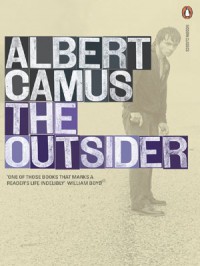Ironic Contradictions
We: Outsiders To All

This review will more or less be an attempt to summarise the notes I took in my seminar today in a way that relate specifically to Albert Camus' The Outsider. Firstly, this will help potential readers understand what the core theme of this classic work is and secondly this will help me be able to summarise the very concepts of existentialism and absurdity as they relate to my studies.
Firstly, it was recommended that The Outsider can be broken into three parts. The first representing the absurd: a theme that continues on throughout the book. The second part represents how the rules, laws and government of others affect the individual and regards how they are imposed. The final part is the part of 'tragic consciousness'. I'll break these points down as I go along!
The 5 Aspects of the Absurd
1. We exist in isolation
2. We are alienated from the self
3. The recognition of modern life's repetition
4. An acute sense of time's passing
5. The answers to life cannot be solved by the rational mind - but it is relied upon regardless
The main character of The Outsider, Meursault, displays all these characteristics in regards to the absurd. He is an isolated character, in other words, he is cut off from the people around him. When at the beginning of the novel he is informed of his mother's passing, he cannot - cannot - grieve over this. He is cut off from her or others as an individual. He is also alienated from himself, at times in retrospect recognising that he hardly understands who or what he is. There is further a clear combination of time passing and 'mechanical repetition' throughout the novel. And finally all these elements culminate in a decisive recognising that though, rationally, none of the problems of life in the novel can be solved, rationality is the tool by which these problems are attempted to be solved.
The second part of The Outsider, regarding how laws and their implementation affect the individual, springs from this understanding of absurdity and existentialism. Existentialism as a philosophical concept seems to work inwardly rather than externally, regarding life entire as meaningless rather than full of any profound purpose. Therefore, laws imposed upon our protagonist seem meaningless to him (though they may lead to death) because he does not recognise the meaning in such laws.
That is until the final part of the novel, in which the moment of 'tragic consciousness' arrives. It is a moment of clarity within the conflict of a work of fiction, the moment at which a character can look back and recognise how they have continued to be stuck in a routine or daily grind and then tragically, the next minute fall back into that same routine. For Meursault, this 'tragic consciousness' moment seems to involve a realisation or recognition of how he has always been happy and can always be happy - even in the face of death. And therein the tragedy is that he comes to wish that the crowds greeting a potential execution are full of anger towards him.
Thoughts From The Afterword
"In our society any man who doesn't cry at his mother's funeral is liable to be condemned to death"
Therein lies the summary of the novel in one paradoxical quote. It is a quote that remarks upon modernity as much as it remarks about existence. The point seems to be served that humanity as a whole is far too quick to judge individuals based on the outward appearance - that to not cry over the death of a loved one (as has happened in the past) means the accused must surely be guilty because they must lack humanity. Yet the only crime being committed may be a crime against the established orders and conventions of the times as much as anything.
"I also once said, and again paradoxically, that I tried to make my character represent the only Christ that we deserve."
Finally, allow me to end with this point. Camus' book is one which deals with many metaphysical issues, among them religion. I have argued elsewhere that I believe all men carry a kind of religion - a series of rituals which they hold to on a level of idolatrous worship - and so will not reiterate such an argument here in regards to this book or quote. I do want to say however that I do not believe Camus means such a statement in any way to be blasphemous (he does suggest as such), but rather that he hopes he has created a character of fiction who represents the way every man has felt at some point - that life is meaningless. And that further he has created a character who represents the same kind of role of Christ (a saviour) in terms of providing a moral lesson that reality and the rules of others are no guideline to live our own lives.
Perhaps it could be even better said that the focus of the quote should be on the final section 'that we deserve'. Camus, in creating a martyr figure, symbolically suggests that we as people are all guilty of the crime of killing the innocent and those who dare to be different to our views and systems, that we as guilty individuals do not deserve a saviour who saves eternally, but one who saves us only from the rigour and ritual of repetition and unhappiness. It is, if anything, a simpler way to look at reality and is dependant upon the day to day in my opinion but it is a fascinating concept to conclude a fascinating work of true literary genius.
 7
7



